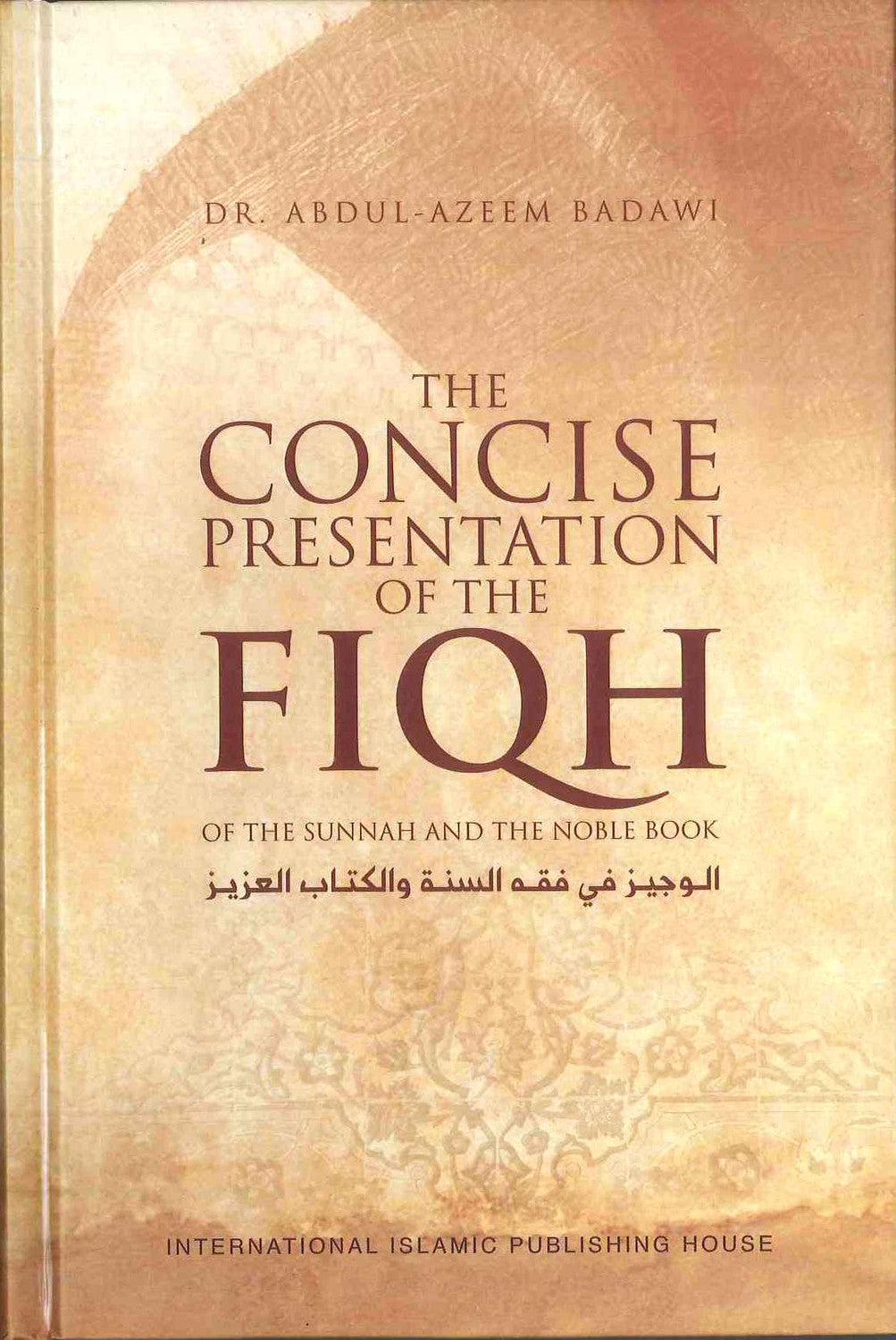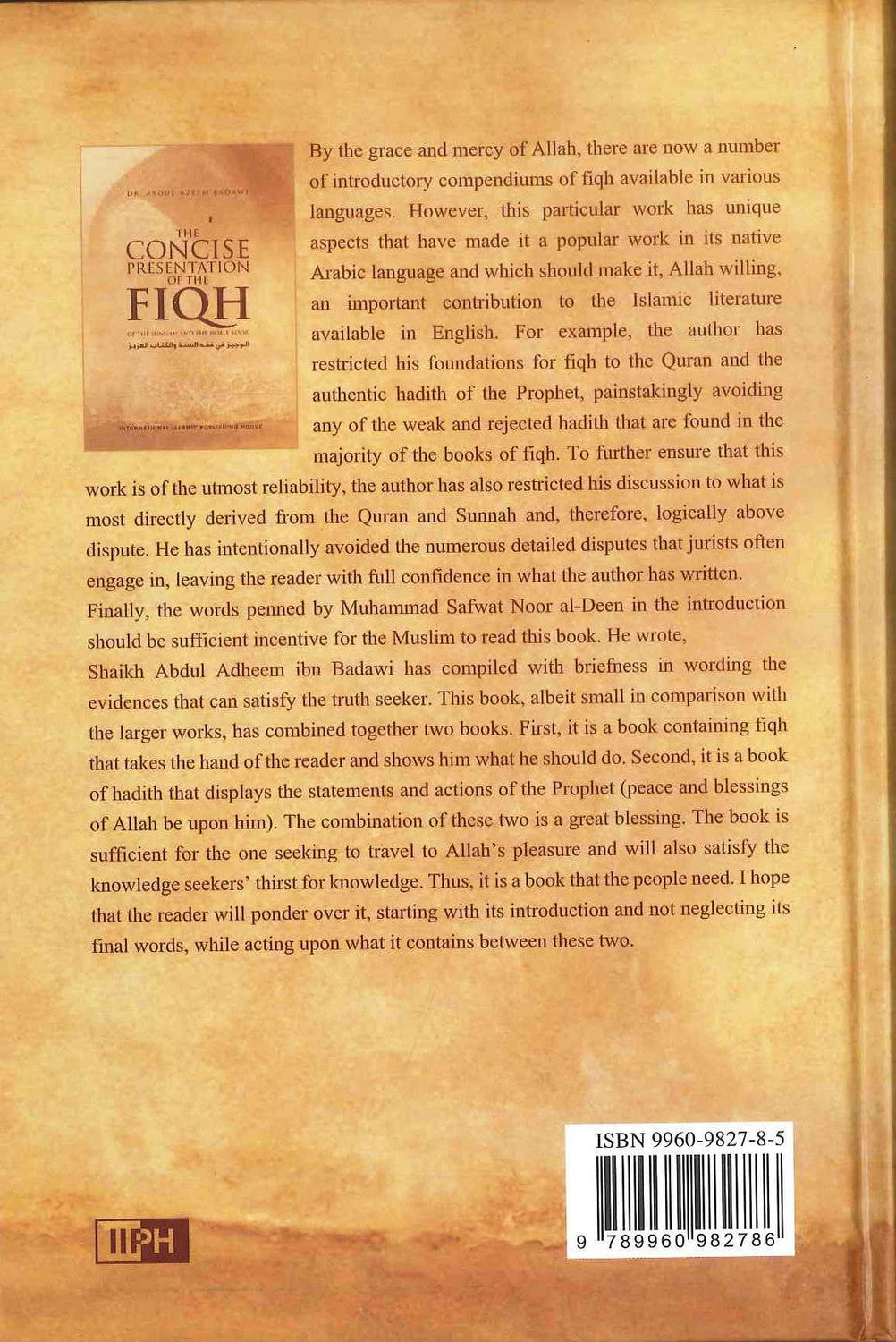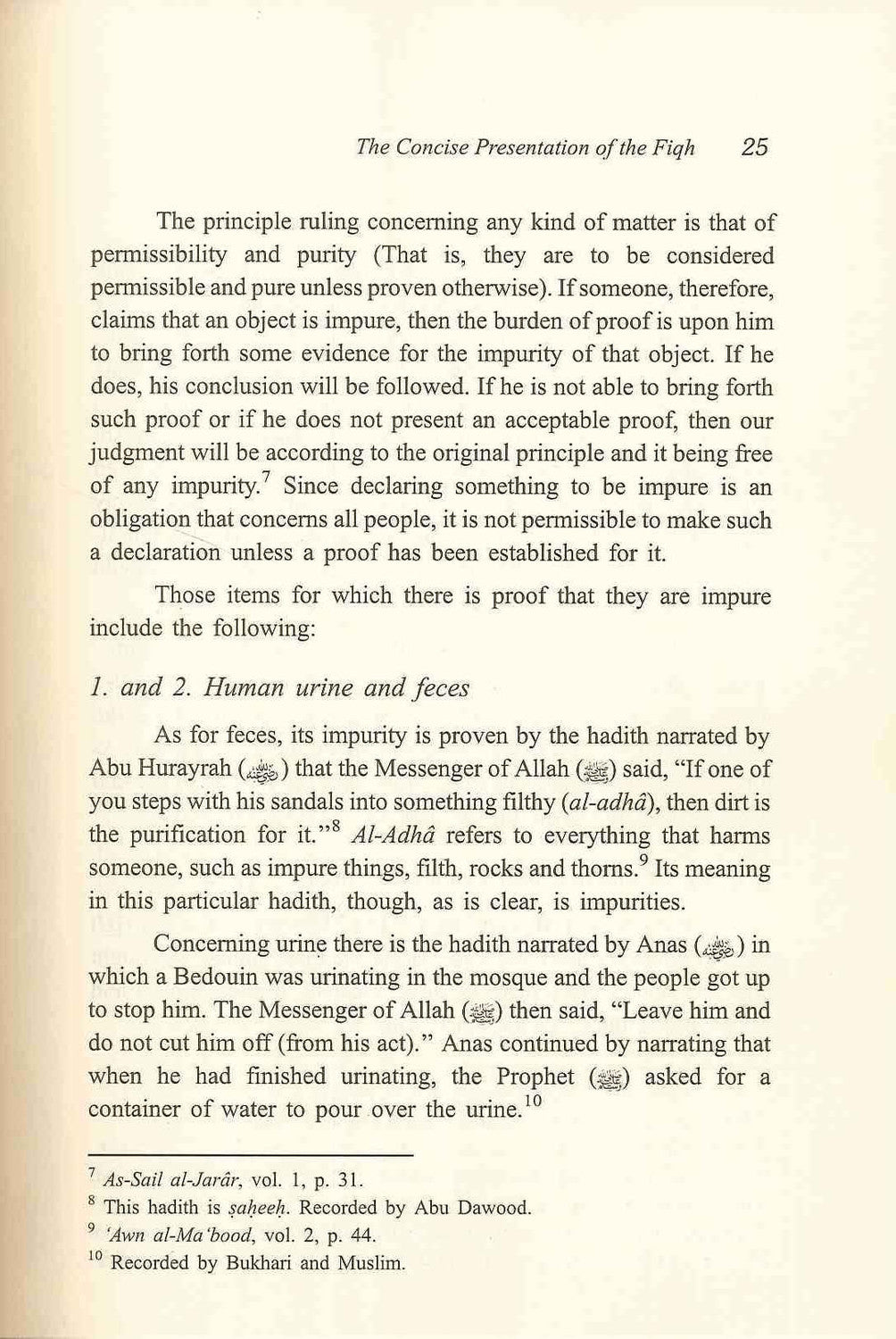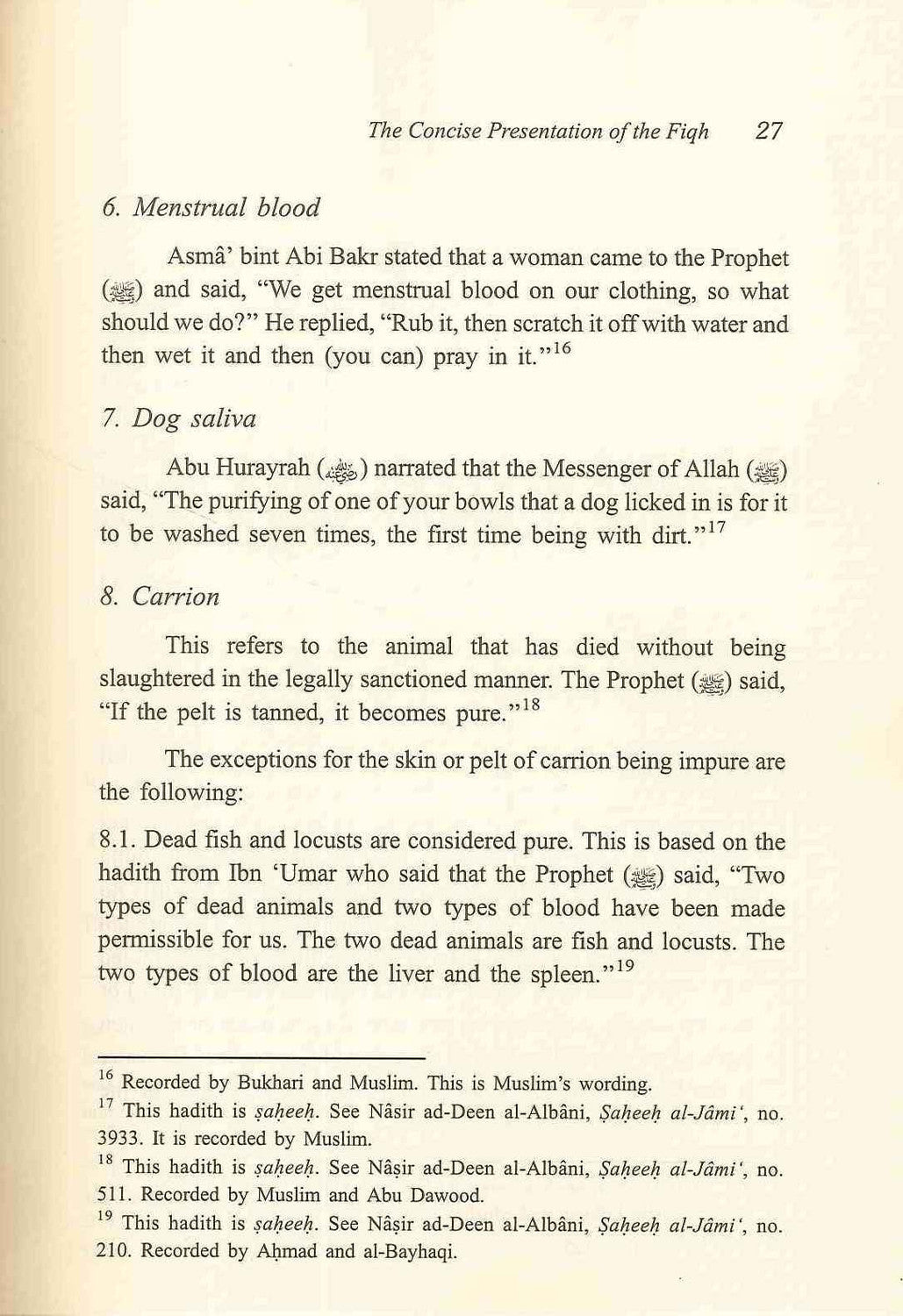The Concise Presentation of The Fiqh
The Concise Presentation of The Fiqh
Publisher:
IIPH (International Islamic Publishing House)
Language:
English
Binding:
Hard Cover
Pages: 702
Size: 17x24cm
Couldn't load pickup availability




Collapsible content
Description of Book
The Concise Presentation of The Fiqh
The Concise Presentation of the Fiqh is a streamlined and accessible summary of Islamic jurisprudence (fiqh), structured to provide both clarity and ease of understanding for students, lay readers, and those seeking a practical guide to Islamic law. The book is rooted in the authentic sources of Islam — the Qur’an and the Sunnah — and seeks to present rulings in a balanced and concise format, avoiding lengthy scholarly debate in favor of clarity and application. Each chapter addresses a core area of fiqh, such as purification, prayer, fasting, zakat, and pilgrimage, as well as aspects of personal conduct, business transactions, marriage, and legal punishments. What distinguishes this work is its commitment to presenting opinions with evidence, without overwhelming the reader with excessive detail. This makes it ideal for both self-study and introductory-level instruction. The language is clear, the rulings are well-organized, and the methodology reflects a Salafi approach, emphasizing adherence to the textual sources and the understanding of the early generations of Muslims. Overall, the book serves as a practical and informative guide for those who wish to implement Islamic teachings in their daily lives
Publisher
IIPH (International Islamic Publishing House)
Author
Sample Pages - Content
PAGE NO :1
DR. ABDUL-AZEEM BADAWI
CONCISE
PRESENTATION
OF THE
FIQU
OF THE SUNNAH AND THE NOBLE BOOK
INTERNATIONAL ISLAMCCOOBLISÅING HOUSE
PAGE NO :2
6. Menstrual blood
The Concise Presentation of the Figh 27
Asma' bint Abi Bakr stated that a woman came to the Prophet () and said, "We get menstrual blood on our clothing, so what should we do?" He replied, "Rub it, then scratch it off with water and then wet it and then (you can) pray in it."16
7. Dog saliva
Abu Hurayrah () narrated that the Messenger of Allah () said, "The purifying of one of your bowls that a dog licked in is for it to be washed seven times, the first time being with dirt."17
8. Carrion
This refers to the animal that has died without being slaughtered in the legally sanctioned manner. The Prophet () said, "If the pelt is tanned, it becomes pure.""
18
The exceptions for the skin or pelt of carrion being impure are the following:
8.1. Dead fish and locusts are considered pure. This is based on the hadith from Ibn 'Umar who said that the Prophet () said, "Two types of dead animals and two types of blood have been made permissible for us. The two dead animals are fish and locusts. The two types of blood are the liver and the spleen.">19
16 Recorded by Bukhari and Muslim. This is Muslim's wording.
17 This hadith is şaheeḥ. See Näsir ad-Deen al-Albâni, Şaheeh al-Jami', no. 3933. It is recorded by Muslim.
18 This hadith is saheeh. See Nâşir ad-Deen al-Albâni, Şaheeh al-Jami', no. 511. Recorded by Muslim and Abu Dawood.
19 This hadith is şaheeḥ. See Nâşir ad-Deen al-Albâni, Şaheeh al-Jami', no. 210. Recorded by Aḥmad and al-Bayhaqi.
PAGE NO :3
The Concise Presentation of rhe Fiqh 25
The principle ruling concerning any kind of matter is that of
permissibility and purity (That is, they are to be considered
permissible and pure unless proven otherwise), If someone, therefore,
claims that an object is impure, then the burden of proof is upon him
to bring forth some evidence for the impurity of that object. If he
does, his conclusion will be followed. If he is not able to bring forth
such proof or if he does not present an acceptable proof, then our
judgment will be according to the original principle and it being free
of any impurity-7 Since declaring something to be impure is an
obligation that concems all people, it is not permissible to make such
a declaration unless a proof has been established for it.
Those items for which there is proof that they are impure
include the following;
I. and 2 Human urine and feces
As for feces, its impurity is proven by the hadith narrated by
Abu Hurayrah ) that the Messenger of Allah (g) said, "If one of
you steps with his sandals into something filthy (al-adhå), then dirt is
the purification for it."S ÄL4dhå refers to everything that harms
someone, such as impure things, filth, rocks and thorns.9 Its meaning
in this particular hadith, though, as is clear, is impurities.
Concerning urine there is the hadith narrated by Anas (a.&) in
which a Bedouin was urinating in the mosque and the people got up
to stop him. The Messenger of Allah (g) then said, "Leave him and
do not cut him off (from his act)." Anas continued by narrating that
when he had finished urinating, the Prophet (æ) asked for a
10
container of water to pour over the urine.
Sail älOgrår,
S hadith is Recorded by Abu Dawood,
a/•Ma'bood,
Recorded by Bukhari and Muslim.
PAGE NO :4
THE
CONCISE PRESENTATION OF THE
FIQH
www
By the grace and mercy of Allah, there are now a number. of introductory compendiums of fiqh available in various languages. However, this particular work has unique aspects that have made it a popular work in its native Arabic language and which should make it, Allah willing. an important contribution to the Islamic literature available in English. For example, the author has restricted his foundations for fiqh to the Quran and the authentic hadith of the Prophet, painstakingly avoiding any of the weak and rejected hadith that are found in the majority of the books of fiqh. To further ensure that this
work is of the utmost reliability, the author has also restricted his discussion to what is most directly derived from the Quran and Sunnah and, therefore, logically above dispute. He has intentionally avoided the numerous detailed disputes that jurists often engage in, leaving the reader with full confidence in what the author has written. Finally, the words penned by Muhammad Safwat Noor al-Deen in the introduction should be sufficient incentive for the Muslim to read this book. He wrote, Shaikh Abdul Adheem ibn Badawi has compiled with briefness in wording the evidences that can satisfy the truth seeker. This book, albeit small in comparison with the larger works, has combined together two books. First, it is a book containing figh that takes the hand of the reader and shows him what he should do. Second, it is a book of hadith that displays the statements and actions of the Prophet (peace and blessings of Allah be upon him). The combination of these two is a great blessing. The book is sufficient for the one seeking to travel to Allah's pleasure and will also satisfy the knowledge seekers' thirst for knowledge. Thus, it is a book that the people need. I hope that the reader will ponder over it, starting with its introduction and not neglecting its final words, while acting upon what it contains between these two.
IIPH
Who is Dr Abdul Azeem Badawi?
Dr. Abdul Azeem Badawi is a respected Islamic scholar known for his contributions to Islamic education and da'wah (inviting to Islam). He is originally from Egypt and is recognized for his efforts in presenting Islamic knowledge in a clear, accessible way, especially for English-speaking audiences. Dr. Badawi has been active in Islamic teaching in North America and is affiliated with various Islamic institutions. His works often focus on practical aspects of Islam, and he is especially known for The Concise Presentation of the Fiqh, where he simplifies complex jurisprudential topics based on the Qur’an and authentic Hadith. His style is methodical, evidence-based, and aligned with the approach of the early generations of Muslims (Salaf)




